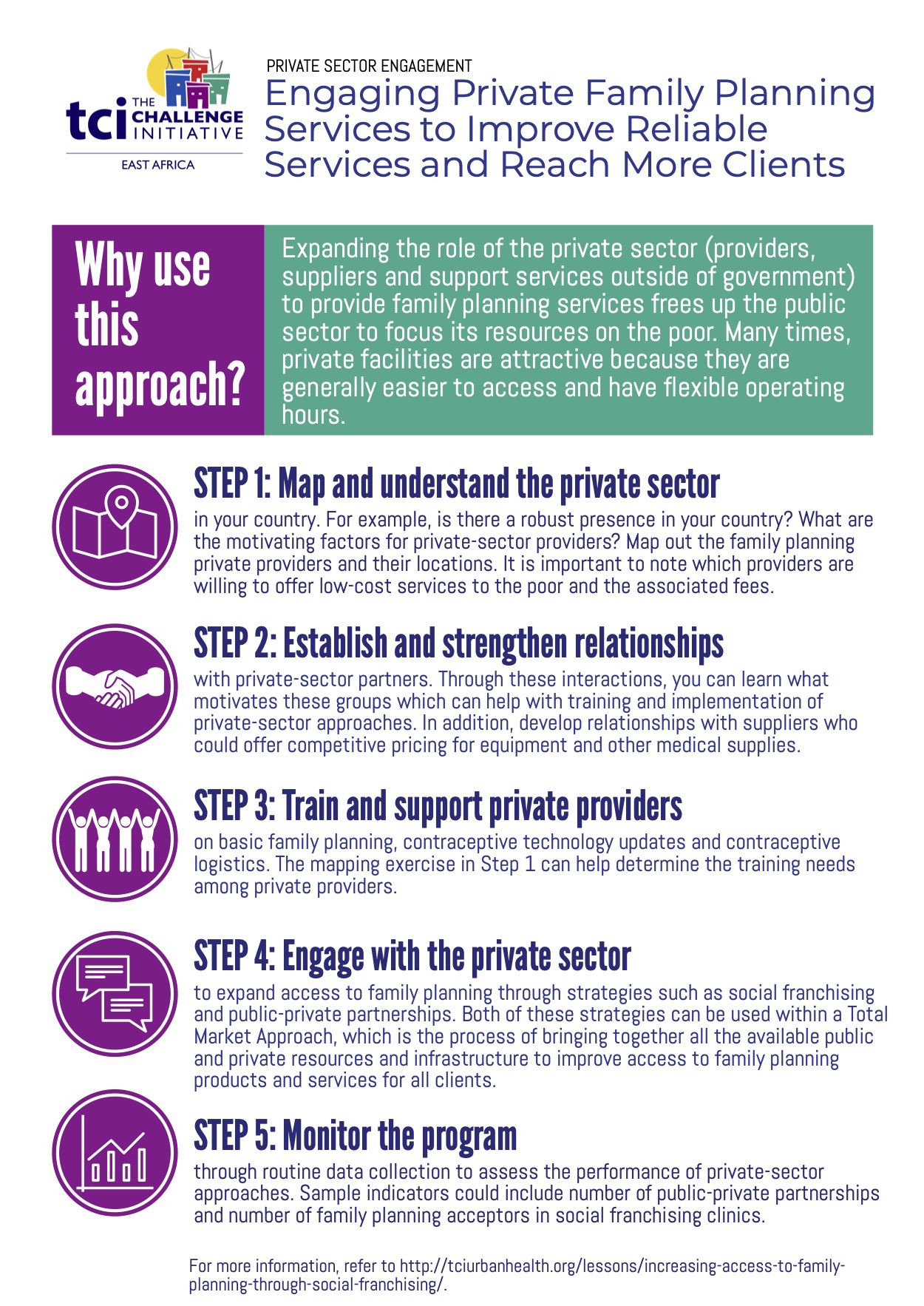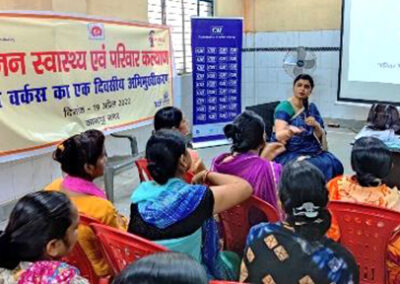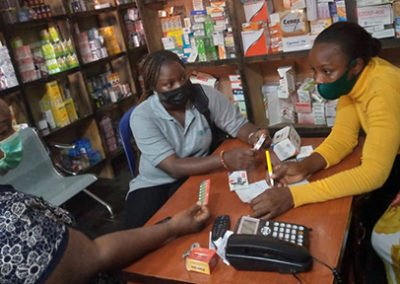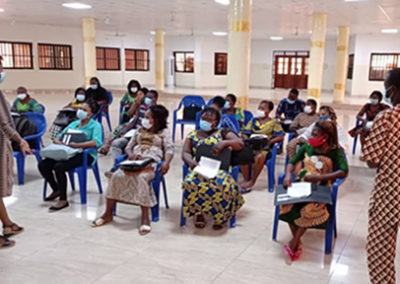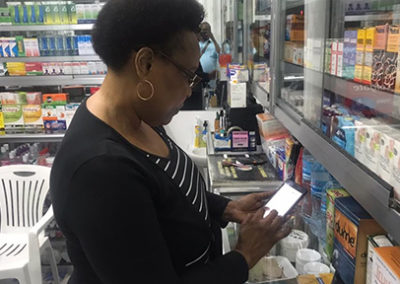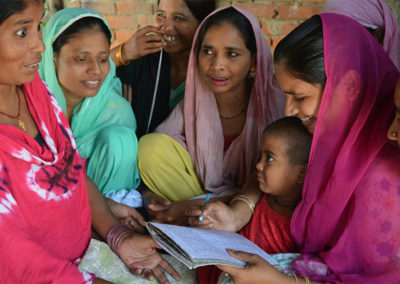TCI Global Toolkit: Service Delivery
Working with the Private Sector- Home
- Help and Support
- Close
- Toolkits
- Global Toolkit
- AYSRH Toolkit
- Hub Toolkits
- Core High-Impact Practices
- Gender Essentials Mini Course
- Close
- Resource Collection
- Community of Practice
- Coaching
- Log In/Register
- My Profile
- English
What Is It?

A patient medicine provider (PMV) attends to a client after a family planning prescription in Omuaran township in Nigeria’s central state of Kwara.
All providers, suppliers and support services that lie outside the government sector. This can include commercial or for-profit entities, nonprofit organizations, community groups, informal vendors and private providers, such as doctors, pharmacies/chemists, drug shops, hospitals and medical schools.
The private sector provides 38% of family planning services in Kenya (Demographic and Health Survey [DHS], 2014), 39.6% in Nigeria (DHS, 2018), 12% in Senegal (DHS, 2017) and 18% for married women in urban India (DHS, 2015-16). It is an attractive source due to ease of access, flexible operating hours and trust bestowed on the health care providers by the community.
Key goals in working with the private sector are to expand the use of existing private family planning services and to make it more attractive for private doctors, midwives and nurses to provide family planning services.
Strengthening Private-Sector Family Planning Services in India
 The Challenge initiative for Healthy Cities India (TCIHC) provides guidance on engaging the private sector to facilitate accreditation, thereby expanding the provider base to meet family planning needs of the urban poor.
The Challenge initiative for Healthy Cities India (TCIHC) provides guidance on engaging the private sector to facilitate accreditation, thereby expanding the provider base to meet family planning needs of the urban poor.
- The government alone cannot provide FP services to all of the population. Through accreditation, terms are agreed upon for purchases and reimbursement that allow the private sector to offer FP services. For example, it provides insurance coverage to providers, coverage in court cases, and compensation of lost wages due to services for clients.
- In Uttar Pradesh, the process of accreditation and empanelment is facilitated by the government through the web-based ‘HausalaSajhedari’ scheme. This scheme makes the process of accreditation and empanelment, especially the reimbursement process, simple and transparent.
- Collaborating with the Federation of OB-GYN Societies of India to offer private providers contraceptive technology updates.
Working with the Pharmaceutical Association in Kenya
Tupange Pamoja partners with the Kenya Pharmaceutical Association and the Ministry of Health to build the capacity of pharmacy staff on available contraceptive methods, how to counsel youth and how to establish an effective referral system. This webinar shares how East Africa uses the high-impact approach on pharmacy engagement to increase access to contraceptive services by young people.
Improving Young People’s Contraceptive Access in Nigeria
In Nigeria, Patent and Proprietary Medicine Vendors (PPMVs) and community pharmacies (CPs) are a major source of health services and medicines, especially for adolescents and young people (15 to 24-years-old). TCI supports incorporating PPMVs and CPs into the public health system by operationalizing Federal Ministry of Health guidelines, strengthening their capacity, monitoring their compliance with the guidelines and building linkages between PPMVs and health facilities.
What Are the Benefits?
- Expanding the role of the private sector to provide family planning services frees up the public sector to focus its resources on the poor instead of trying to serve all socioeconomic groups.
- Privately run facilities often face gaps in skills, medical equipment and other standards. Working with the private sector to address quality gaps will provide better and more reliable services for clients.
- Private facilities are attractive options for many clients because they are generally easy to access and may have flexible operating hours.
How to Implement?
Map and understand the private sector in your country
- Does the private sector in general have a robust presence in your country? What factors motivate private-sector providers in your country and setting? Understanding these issues is a critical first step in determining whether it makes sense to engage the private sector and how to best work with the private sector.
- Start by mapping out private-sector services to understand who private providers of family planning are and where they are located. It is also important to note which providers are willing to offer low-cost services to the poor and what their fees are. Also note the level of knowledge or skills of the private providers to better understand training needs.
Establish and strengthen relationships with private-sector partners
- Relationships with private-sector partners are crucial for expanding use of the private sector for family planning services. Through these interactions, you can also learn what conditions would make it more attractive for private doctors, midwives and nurses to provide family planning services. For example, do they need more training? More equipment? More connection to suppliers? Learning what motivates these groups can help with training and implementation of private-sector approaches.
- Professional associations play an important role in supporting quality family planning programs. For example, the Urban Reproductive Health Initiative in India worked with the Federation of Obstetric and Gynaecological Societies of India, and in Nigeria with the Family Planning Providers Network. Leaders of these associations are often prominent and connected, and they may be more willing to provide low-cost services as a social good, since they may charge higher prices to their wealthy clients. They can also be influential in changing norms in their professional communities and can help provide contraceptive updates, training and mentorship to their peers.
- Develop and maintain relationships with suppliers who could offer competitive pricing for equipment and other medical supplies
Train and support private providers
- Based on the mapping exercise you conducted in Step 1, you can determine the need for training among private providers. For example, upon mapping out private providers, NURHI supported the National Ministry of Health, in collaboration with the Society for Family Health, to develop a training program for private providers.
- In general, all private providers will need at least some training, whether on contraceptive technology updates or more basic training about family planning.
- Private providers will also need support with contraceptive logistics, to make sure that contraceptive supplies are regularly available at their practice.
Engage with the private sector to expand access to family planning
Once you have mapped out the private sector in your setting, you can now begin implementing strategies to help expand private provision of family planning.
Some examples of private-sector strategies include:
- Social franchising: A service delivery approach that organizes small, independent health care facilities into networks. The franchisor, who manages the network, enters into a memorandum of understanding (MOU) with each health facility owner (the franchisees) to expand family planning services offered, under agreed terms and conditions. Two key conditions are for the franchisee to deliver a broad range of contraceptive methods at an agreed pricing structure and benchmarked quality standards. In return, the franchisee gets equipment, supplies and commodities at subsidized prices and receives training, supervision and mentorship. Franchising programs also engage providers to ensure access for low-income clients. Social franchising was used in Kenya and helped to improve services provided by private providers.
- Public-private partnerships: A formal arrangement between a government agency and a private company. Investments, risks and rewards are shared in order to provide a benefit to the general public. These partnerships can result in increased local engagement, as well as a sustainable network of family planning providers that can actually increase the demand for contraceptive services. For more information on public-private partnerships, see Public-Private Partnerships for Family Planning from the SHOPSPlus Project.
Promotion of private-sector services is also important, as clients need information about where private family planning services are located, as well as clinic hours and prices. For example, in Kenya, branding and social marketing were key for promoting private provider networks. Sample materials can be found here. Community health workers in India also helped to distribute information sheets publicizing clinic addresses and hours.
You also may need to work directly with the private sector to ensure accreditation and empanelment (linking patients to specific health care providers), to ensure that the private sector is able to provide family planning services. The Urban Reproductive Health Initiative in India worked to convene regular meetings and keep private providers informed about accreditation and empanelment issues. They also worked to ensure timely payments/reimbursement for the private providers. For more lessons learned from India, including specific roles and responsibilities for the various partners, see here.
Social franchising and public-private partnerships are strategies that can be used within a Total Market Approach (TMA). TMA is the process of bringing together all the available public and private resources and infrastructure to improve access to family planning products and services for all clients. The goal of a total market approach is to ensure that those in need of family planning can access it through varying channels: Low-income clients receive services for free Those with slightly more financial means pay a little Those with the most robust ability to pay can purchase their services directly from the commercial sector This planning guide is helpful, if you choose to implement a total market approach.
Monitor the program
Routine data should be collected at regular intervals to assess the performance of private-sector approaches.
Sample indicators include:
- Number of public-private partnerships
- Number of mentees completing mentorship in social franchising programs
- Number of family planning acceptors in social franchising clinics
- The Daily Activity Register is used by the health facility staff to register each acceptor.
- The acceptors are compiled by the in-charge of family planning into the health facility monthly totals and are reported at the end of every month.
- Number of applications for private sector provider accreditations received by the district health office in the previous month. (For more indicators on accreditation in India, see here.)
What Is the Evidence?
- In India, private sector engagement led to an increased uptake of family planning services, under the Hausala Sajhedari initiative of the Government of Uttar Pradesh (India TCI Toolkit).
- Pharmacies and drug shops are the dominant source for pills, emergency contraception and condoms for women in Kenya and Nigeria (GHSP).
- When social franchising programs were scaled up across Africa and Asia, service quality and efficiency improved significantly (GHSP).
Evidence from the Urban Reproductive Health Initiative (URHI)
- Although the use of public vs. private facilities varies widely by type of method and by city, data from the Urban Reproductive Health Initiative country endline surveys indicate that the private sector has an important role to play in increasing access to family planning. In six cities in India, the percentage of women using IUDs who used a private provider ranged from 39% to 81% (India endline survey reportt); in six cities in Nigeria, the percentage ranged from 0% to 32% (Nigeria endline survey report).
- More than half of women who reported having heard of or seen an Amua-Tupange social franchise facility said they knew what types of health services were provided at the facilities, with a majority of the women (over 85%) in each city reporting that they knew family planning services were provided there (Kenya Endline Household Survey 2014).
TCI APP USERS PLEASE NOTE
You will only receive CERTIFICATES by email – when earning a score above 80% – and will not be able to view or print a certificate PDF from the TCI app.
Test Your Knowledge
Earn a Certificate
Quiz Summary
0 of 6 Questions completed
Questions:
Information
You have already completed the quiz before. Hence you can not start it again.
Quiz is loading…
You must sign in or sign up to start the quiz.
You must first complete the following:
Results
Results
0 of 6 Questions answered correctly
Your time:
Time has elapsed
You have reached 0 of 0 point(s), (0)
Earned Point(s): 0 of 0, (0)
0 Essay(s) Pending (Possible Point(s): 0)
Categories
- Not categorized 0%
- 1
- 2
- 3
- 4
- 5
- 6
- Current
- Review
- Answered
- Correct
- Incorrect
-
Question 1 of 6
1. Question
The private sector can vary greatly from city to city and from country to country. During expansion to new geographies, a critical first step in engaging the private sector is to map private-sector providers, learn who is likely to serve the poor and assess their knowledge and skills and factors that motivate them.
-
Question 2 of 6
2. Question
What are the benefits of expanding the role of the private sector to provide family planning services?
-
Question 3 of 6
3. Question
What are some strategies that can be used to help engage with the private sector to expand access to family planning?
-
Question 4 of 6
4. Question
Private providers may not see a need to include family planning. Therefore, it is important to consider ways to increase the motivation of private providers, including incentives to provide family planning at low cost to the poor, for example, by giving private providers free contraceptives.
-
Question 5 of 6
5. Question
How do you intend to use the information reviewed and/or tools that you accessed?
-
This response will be awarded full points automatically, but it will be reviewed and possibly adjusted after submission.
-
-
Question 6 of 6
6. Question
How useful did you find the information and/or tools presented on this page? Please write your response in the box below using one of the following phrases: Very useful, Useful, Somewhat useful, Not useful.
-
This response will be awarded full points automatically, but it will be reviewed and possibly adjusted after submission.
-
Service Delivery Approaches
Helpful Tips
- Most private providers need at least some training. Make sure to include training on commodities and logistics, in addition to technical contraceptive updates.
- The poor are often unaware that private clinics provide contraception because family planning is often seen as a public-sector service. The poor may also not realize that the private sector sometimes offers family planning at low cost or that it typically offers more flexible hours than the public sector. Thus, promoting private-sector services is important.
- Providing family planning services is a social good but not a major profit maker for private providers because it takes time to do appropriately. Thus, you may need to provide incentives to private providers to offer contraceptives at low cost.
- Professional associations can play an important role in supporting quality private sector FP services for the urban poor and should be engaged, especially in expansion to new geographies.
Challenges
- The private sector can vary greatly from city to city and from country to country. During expansion to new geographies, a critical first step in engaging the private sector is to map private-sector providers, learn who is likely to serve the poor and assess their knowledge and skills and factors that motivate them.
- During your mapping exercise, it is also important to learn who from the communities are already accessing private services and from where. This will facilitate strategic selection of providers to engage with and support.
- Private providers may not see a need to include family planning. Therefore, it is important to consider ways to increase the motivation of private providers, including incentives to provide family planning at low cost to the poor, for example, by giving private providers free contraceptives.
External Resources
- Public-Private Partnerships for Family Planning: Case Studies for Local Participation (SHOPS Project)
- Private-Sector Social Franchising to Accelerate Family Planning Access, Choice, and Quality: Results From Marie Stopes International
- Planning Guide for a Total Market Approach to Increase Access to Family Planning Toolkit
- Total Market Approach to Family Planning


